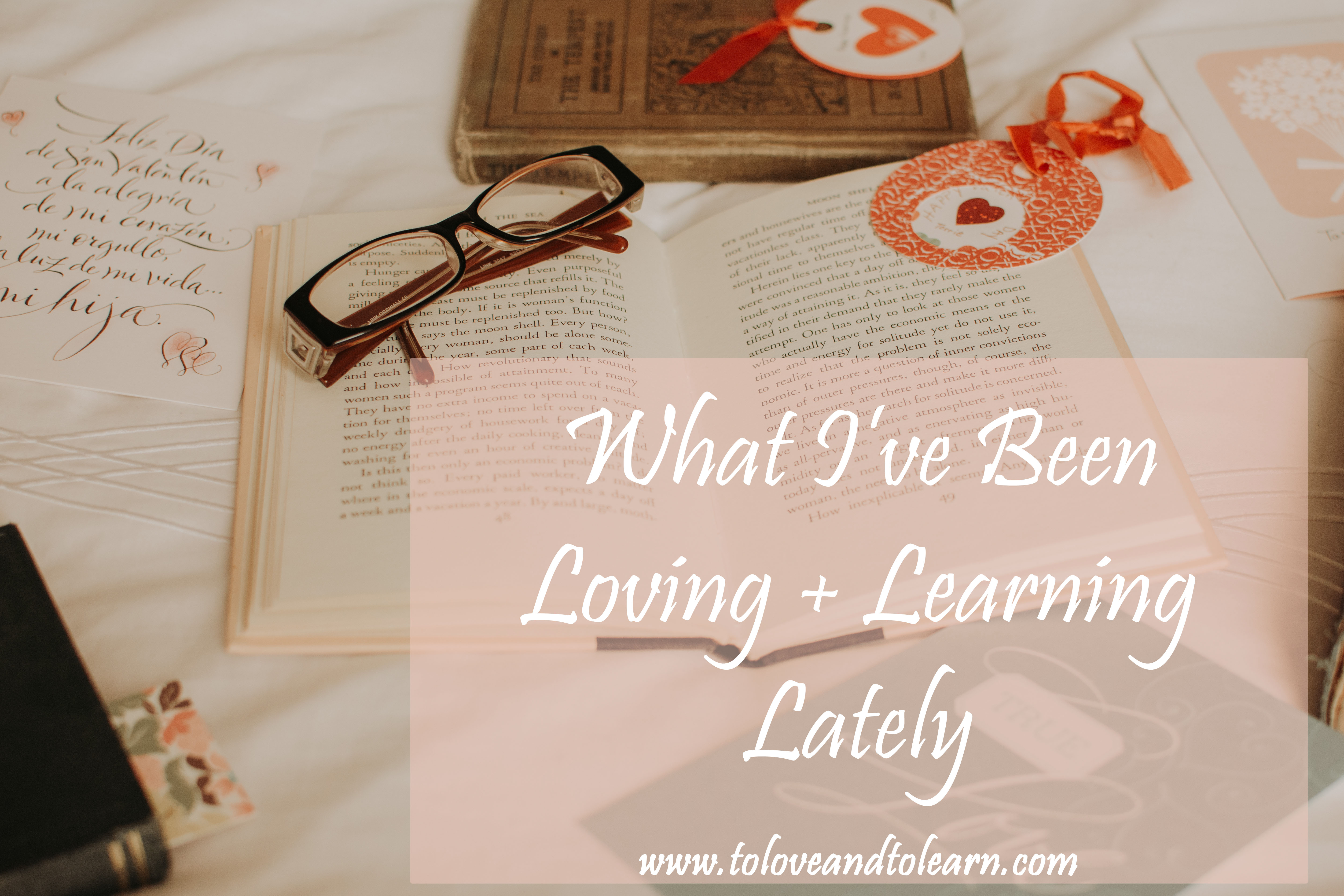
A little more than a year and a half ago, I made an important shift in my reading life—I started not only recording the books I was reading on Goodreads (on a regular basis) and giving them ratings, but I also made the decision to always, ALWAYS give a review of some kind once I finished. I’ve been reviewing books on my blog since 2011, but now that my reading habits have picked up quite a bit over the past couple years (and my reading tastes have been refined a bit more), I found that an old teacher tendency started to creep up on me—
I wanted my ratings to be more consistent, to follow a definite sort of criteria, so that when asked why I gave such and such book a certain rating, I could have a ready answer (even if I couldn’t even really remember a lot about the book’s particulars).
So I created a “grading rubric” of sorts (because apparently you can take the teacher out of the assessment practices, but you can’t take the assessment practices out of the teacher, or something like that). While these rules don’t always make it EASY to decide what to rank a book after I’ve read it, they definitely have simplified the process, and I’ve noticed that since adopting them, I’m rarely wanting to change any of my previous rankings (something I was wanting to do quite a lot before).
Just for fun, though, before we get to what constitutes a 5-star read, let’s start at the bottom with my criteria for getting just one, and move up from there.
Note: There are affiliate links below through Amazon, which means I get a small percentage of each sale made (at no extra cost to you). Thanks for supporting To Love and To Learn!
One-Star Rating
- A book must be truly awful to get a one-star rating. In fact, so few books receive this rating from me simply because if a book is this awful, I usually won’t even finish it.
- In the past, I gave two books a one-star rating (Heart of Darkness, Tender is the Night) that I’m sure I would give a slightly higher rating to if I re-read the book now, simply because now, if I’m giving a book one-star, it’s because I basically see no merit in the book, or I find it so despicable on some level (often in its message or content) that I just hate the experience of reading it. As both of these books are considered classics, chances are high that if I gave them a shot now that I’m a *bit* more mature, I might at least be able to see WHY they are classics, which would help boost their rating.
- In fact, since I’ve started rating books, there are only five books I’ve given this low of a rating to (since I won’t rate a book unless I’ve read it in its entirety), the other three of which were: Wicked (yes, the one the musical is based on), Give it Up!, and Julie & Julia (yes, the one the movie is based on).
- The only book I’ve given a one-star rating to in recent years is Give It Up!, so it’s the only one I feel confident I would STILL give a one-star rating to now. It’s the story of an upper middle-class woman who decides to give up some of the superfluous things in her life in pursuit of greater happiness (such as shopping for clothes, nights out drinking with friends, etc.). Sounds like it would be right up my alley, right? (Especially because I’ve recommended books that have a similar premise very recently, like this one.) Well, this book was awful–the writing was lackluster, there was very little personal growth that I saw, and I kept having the nagging feeling that the author had only undertaken the project because she wanted to publish a book, and this seemed an easy way to go about getting a contract.
Two-Star Rating
- One thing that’s important to me is writing style, so if a book’s writing feels too juvenile or forced or cheesy or whatever, that can quickly take it down to two stars for me.
- I’ve noticed lately that many of the books that I’ve been giving two stars to in the past little while have been because the book didn’t match up to my (higher) expectations for it. I have often found that when I read a particularly great book by a new author (new to me, that is), often the second book I read by that author gets a lower rating. I’m guessing this is because I generally only try new authors that come highly recommended, so if a certain book gets a lot of buzz by that author, I’ll go for that one first and then read less-talked-about books later. Often, those less popular reads won’t get as high of a rating, but I’ll unfortunately be expecting a lot more from them just because of my experience with the other book I read by that author. This happened recently with Circling the Sun by Paula McLain–I’d read The Paris Wife years ago and really liked it, so I was excited to check out this newer release by her, but it ended up being far below my expectations.
- I don’t always need likable characters if the story or the writing style are good enough, but if I really hate a main character (particularly if I find him/her annoying), that’s a quick way to drive down a novel to two stars. Some examples: Twilight (though the writing was cheesy enough that I’m not sure it could have gotten a higher rating even if I had liked Bella, which I didn’t), Lemon Tart (writing style also played a major factor in this one), and Every Exquisite Thing (writing was fine, even likable–but the main character + the terrible ending were enough to take this one right down).
- I don’t need happy endings to like a book or even need an ending to wrap everything up (in fact, I often prefer some ambiguity to my endings rather than to have everything *too* neatly tied together), but if I hate an ending, it’s definitely enough to kill any higher rating the rest of the book might have merited. It seems that the final books of series often fall into this category, which is why you’ll notice that Mockingjay and Allegiant both got two stars from me on my Goodreads account.
- Occasionally, if a book has too many “triggers” in it (profanity, explicit sexual scenes, superfluous descriptions of gory violence, etc.), it’s enough to push a rating down for me. That was the case with The Girl With All the Gifts (for profanity and violence) and it didn’t help the case for The Course of Love (because the section on adultery just made me so mad).
- And sometimes, a book just is a little too slow or goes on too long without saying much of anything or just doesn’t grab my attention, which was the case for New Slow City, The Signature of All Things (though all the sexual content took this one down, too), and Traveling With Pomegranates.
Three-Star Rating
- Often, the books that get three stars are the ones that I didn’t feel strongly enough either way to give it a higher or lower rating. In other words, I didn’t mind the experience of reading it, but it didn’t necessarily have much staying power, either. Often, my “fluff” reads fall into this category, such as the To All the Boys I’ve Loved Before that I just finished–it was a fun, light read to pass the time, but it’s not the kind of book that I would be eager to re-read or that I will think back on often.
- A book pretty much has to get at LEAST three stars from me in order for me to ever recommend it, and I’ve found that with a lot of my 3-star reads, it was a book that was just in the middle for me but I could also recognize why it would be a GREAT book for someone else. Take the book The Orphan Keeper as an example—while I got hung up on some of my issues with the writing style and narrative choices, I could totally see why someone else would give that book five stars because the story is AWESOME.
- Basically, if a book gets three stars, I at least see some merit in its plot, writing style, message,etc., and I also–to some extent–had to have been at least somewhat entertained by it (or it at least made me think). Classics are notoriously hard for me to rank because I often don’t ENJOY my reading of them, but because I almost always see their merit, they will usually always get at least 3 stars from me (if not 4), even if I don’t necessarily LIKE the story. Some examples would be A Passage to India, Wuthering Heights (though I feel I need to give this one another shot now that I’m older), and A Room With a View.
Four-Star Rating
- Ah, now this is where it gets really good! To get four stars, a book almost always has to be well-written and well-paced (if it’s a novel) or have some really thought-provoking content in it (if it’s nonfiction).
- A four-star book is one I thoroughly enjoyed and usually would not hesitate to recommend (though some, like Beartown and The Goldfinch, both of which I gave 4.5 stars to, I do have to recommend with caveats, as they have quite a bit of content–profanity, sexual references, etc.–that might be offensive to some readers). Sometimes those triggers are the ONLY thing holding me back from giving the book 5 stars, in fact, which was the case with both of those books.
- A four-star book must be memorable, to some degree. Often with my 3-star reads, I forget plot or character details within months, but with a 4-star read, those things must be sufficiently memorable for me to give it that higher rating.
- Interestingly enough, I actually find that my four-star books are often more easily readable or “un-put-down-able” (to borrow a term from Modern Mrs. Darcy) than my five-star reads, which might seem a little backward. Often that’s because a five-star read tends to have more “meat” in it, which can make it a lot harder to read (or mean that it has a slower plot). Actually, I would even venture to say that the books I’ve given four stars to are more likely to appeal to a general audience than the books I give five stars to (more on that in a minute).
- A few four-star picks that I’ve finished this year: The Snow Child, El Deafo (the first graphic novel to get the designation), and This Must Be the Place.
Five-Star Rating
- Last the best of all the game! To get five stars from me, the book almost always has to be extremely well-written (and I definitely tend to favor books whose writing style would be considered more “literary”) and needs to have strong, memorable characters (and it often helps if those characters are likable too, though that isn’t ALWAYS necessary!).
- The book’s pacing needs to be such that I always or almost always look forward to reading it and seek out opportunities to read it whenever I can (though a few of the titles that have gotten the designation, like classics, don’t always fit that criteria).
- While a 5-star book can occasionally have some aspects I don’t love (like profanity, vulgarity, etc.), it’s much more common for me to favor stories that DON’T have those triggers in them for my highest ratings. (Part of the reason for this is because I figure if I’m giving a book five stars, I’m usually excited enough about it that I want to recommend it to EVERYONE, which I just can’t do if it’s got a lot of content stuff I have to warn people about.)
- Besides wanting to recommend it to just about everyone, a five-star read needs to be a book that I’d be excited to read again, which is actually really saying something coming from me (since I hardly re-read books ever). For instance, I just finished Cutting For Stone–which I LOVED–but one of the main reasons I didn’t give it five stars is because I’m just fine with having read it once and calling it good. For me, a 5-star book should be so good that I almost want to start reading it again as soon as I’ve finished it. (It’s this criteria that makes it so that far more nonfiction reads get five stars from me than fiction ones, just because I’m so much more likely to want to re-read something nonfiction.)
- Lastly, a five-star book has to be life-changing, paradigm-shifting, or completely unforgettable in some way to earn the ranking.
- Since I’ve recently set the bar so much higher for my five-star reads, I’m actually starting to go through the books I gave five stars to years ago and re-reading them to see if they still deserve that designation. (For example, I recently read Peony in Love for the second time and knocked it down to four stars–and almost knocked it down to three, but the ending saved it–after a re-read, just because I REALLY didn’t like the first part of the book, and there was a lot more sexual content than I’d remembered.)
Perhaps another time I’ll share a post about some of the life-changing nonfiction books that definitely earned their five stars fair and square, but for today, I’ll go ahead and share ten of the novels:
10 Five-Star Fiction Reads
 Title: Peace Like a River
Title: Peace Like a River
Author: Leif Enger
The perfect example of how my five-star books might not be as universally appealing as some of my four-star picks. Peace Like a River definitely skews more “literary”–the writing is seriously beautiful, almost like poetry–and I don’t remember the plot being one that was particularly fast-paced. But!–the characters were memorable, the ending was just as it should be, and I’m STILL excited to re-read this one (since I haven’t yet, seeing as I just read it last year). This is the story, told from a child’s perspective, of how the narrator’s brother has to go on the run from the law after killing someone who was threatening their family, thus becoming like a real-life “outlaw.” The book explores everything from religious themes like miracles to the question of which is more important–staying true to your family, or staying true to the law, even if you think it doesn’t “apply” in this case. This definitely has a distinct “Western” feel, but don’t let that turn you off–I didn’t think I was into Westerns, but I was definitely into this book.
Title: The Kite Runner
Author: Khaled Hosseini
This is definitely not an easy book (emotionally) to read, but it DEFINITELY fits the criteria of being highly memorable (and the added benefit of being totally engrossing). I’m definitely due for a re-read of this one (as it’s been about seven years), but elements of the story have still stayed with me, even after all this time. The Kite Runner is the story of two boys who both grew up in the same household but under very different circumstances (one was the master of the house’s son, the other was one of the servants). When a horrific event happens to the servant–and the other boy does nothing–the effects are long-lasting and devastating. This remains one of the most powerful novels about the concept of forgiveness that I’ve ever read.
 Title: Memoirs of a Geisha
Title: Memoirs of a Geisha
Author: Arthur Golden
I believe this is now the third book roundup of mine that this book has made it onto (the others were Riveting WWII Books and Love Stories For People Who “Don’t Do” Romances). So obviously I love this book. Memoirs of a Geisha is about a girl who is sold by her parents into the geisha life, and while the story deals with growing up and dealing with hard things and rising up against your fiercest rivals, it’s a love story at its heart, and how one act of kindness and compassion can change a life forever.
 Title: Crossing to Safety
Title: Crossing to Safety
Author: Wallace Stegner
This is the only adult fiction novel to have earned five stars so far this year (other than Sense and Sensibility), and though I finished it back at the beginning of March, I still think about it all the time. As I wrote in my Goodreads review, very few writers could take such a quiet plot and spin it into such a compelling story, but Stegner manages to do just that in this novel. On the surface, this is not a book about much–it basically just follows the progression of the friendship of two couples over much of a lifetime–but at the same time, it’s a book about everything, or at least a book about everything that matters. I seriously can’t wait to read another of Stegner’s works (and the only reason I’m waiting is because I’m actually going to break one of my usual book-buying rules and buy a few before I’ve read them, just because I’m confident I’ll want to read them with a highlighter in hand).
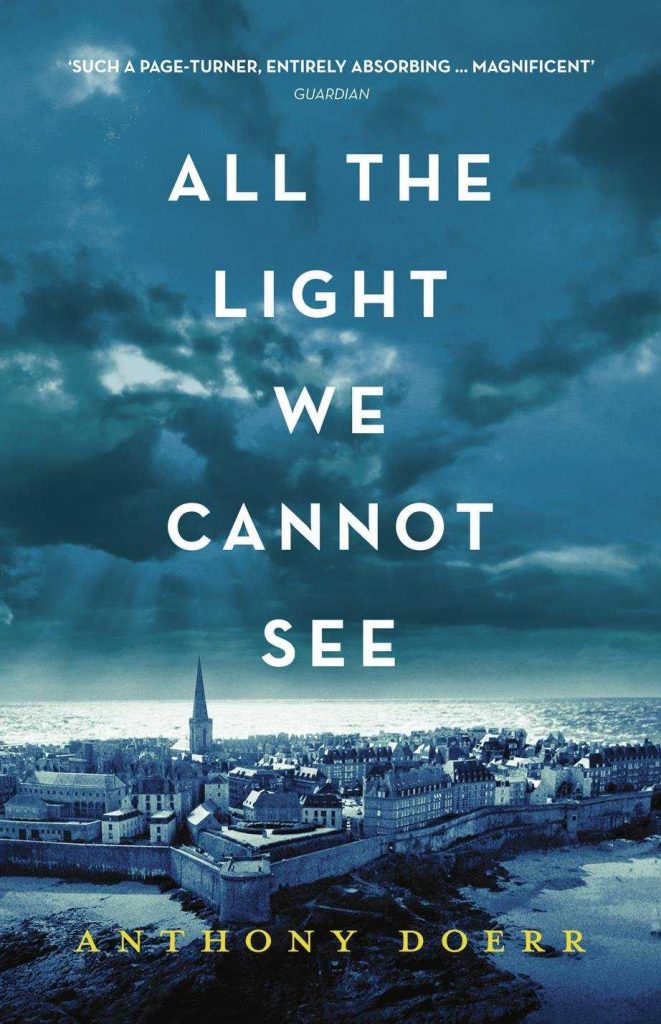 Title: All the Light We Cannot See
Title: All the Light We Cannot See
Author: Anthony Doerr
Here’s another one I can’t wait to read again (and have wanted to ever since I finished it). In fact, I liked this one so much, I immediately looked up everything else the author had written (which actually isn’t much) and bought his Four Seasons in Rome (which, for the record, was a 3.5-star read) soon thereafter when I came across it in a used bookstore. All the Light We Cannot See is the story of a blind girl, a famous jewel, and an orphaned-boy-turned-soldier during WWII, whose paths eventually intersect in an unexpected and memorable way. The writing is a large part of why I loved this one so much–it’s told in short snapshot-like chapters with continually varying viewpoints, and the prose is so beautiful that it should come as no surprise that the author was actually given a generous amount of money AND a stint in Rome, just so he would finish writing this.
 Title: The Handmaid’s Tale
Title: The Handmaid’s Tale
Author: Margaret Atwood
Although many people love this for the way it explores current political and social issues, I loved it for its compelling story and its fabulous prose (this was my first exposure to Atwood’s writing, and I knew immediately it wouldn’t be my last). This dystopian novel (written well before the dystopian genre got “trendy”) is about a futuristic society where many rights (such as the right to read) are taken away from women in the name of “protecting” them, and how women in this society hope above all else that they’ll get pregnant during their mandatory “meetings” with their Commanders, as their value and worth is determined by their fertility. While the society is obviously super disturbing, I found the book to be compelling and thought-provoking, and while some people hate the unresolved ending, I personally thought it was quite brilliant.
 Title: The Help
Title: The Help
Author: Kathryn Stockett
I’ve found that when it comes to super popular fiction that nearly everyone has read, I can often become a bit snooty without meaning to be, in that I try really hard to find something to criticize or a reason to not like it as much as everyone else. While a part of me halfheartedly tried to do the same for The Help, I quickly just got wrapped up in this story set in Mississippi during the Civil Rights Movement and thoroughly enjoyed it. I don’t often reread books (and for several years, I actually didn’t “let” myself reread anything), but this is one that I’ve actually listened to on audiobook (which is FABULOUS, by the way, and if you haven’t already tried a free trial of Audible, you can listen to it through that) two or three times since, just to enjoy the pleasure of getting lost in this world and time period again. This book might not be as “literary” or “life-changing” as some of the other books on this list, but it’s one where I just absolutely fell in love with the story.
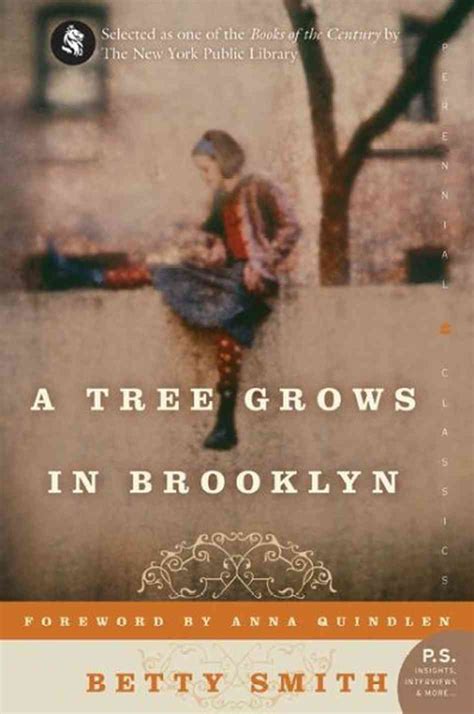 Title: A Tree Grows in Brooklyn
Title: A Tree Grows in Brooklyn
Author: Betty Smith
I don’t think it’s a coincidence that about a third of the books on this short little list deal with “quiet” plots–in other words, literature that represents life as it really is. While I love to get immersed in a different culture or different time period (which is also evidenced in this list), I also love a well-written book that I can totally relate to on some level because it represents MY life in some way. A Tree Grows in Brooklyn is just such a book–in reading about Francie Nolan’s childhood, it’s like you’re reliving your own childhood. The details of both might not be the same at all, but the FEEL of childhood is captured so magically in this book that I’ve rarely read anything else to rival it.
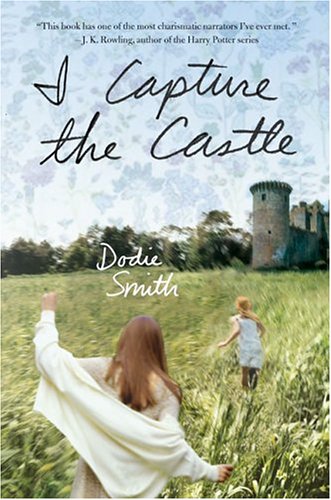 Title: I Capture the Castle
Title: I Capture the Castle
Author: Dodie Smith
This is actually a five-star read from many years ago that I’m currently rereading to ensure that it still will earn five stars, but I’m fairly confident (based on what I can remember) that it will. This novel about a young aspiring writer living in a crumbling old castle with her poverty-stricken family reads like escapism of the best kind. I don’t remember a ton of the details (I read it over a decade ago, I believe), but I do remember that this book made me want to pick up my pen and start writing again AND that it made me want to go find a castle for sale somewhere, ASAP.
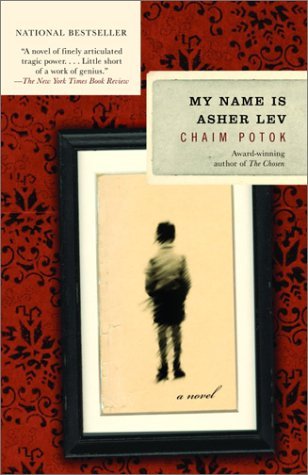 Title: My Name is Asher Lev
Title: My Name is Asher Lev
Author: Chaim Potok
Sometimes it’s the writing or the characters or the setting that really stick out to me in a book, but in this one, it was actually the THEME that has never left me. This entire book is basically about a Jewish boy who is this phenomenal artist, but as he progresses in his work, he has to face a crucial question–when his artistic vision goes against what his faith teaches (in this case, he wants to produce a work with a definite Christian theme), what should he then do? I’ve always wanted to be a writer and I’ve also always been very devoted to my faith, and at times, I recognize that the two don’t always mesh well, so this book really made me think a lot. As it’s been almost a decade since I read it, I’m thinking it’s another one due for a reread soon!
What are the fiction books that YOU would give five stars to? And what are your own criteria for awarding a book this highest of ratings?
Linking up with Modern Mrs. Darcy for her Quick Lit series!






